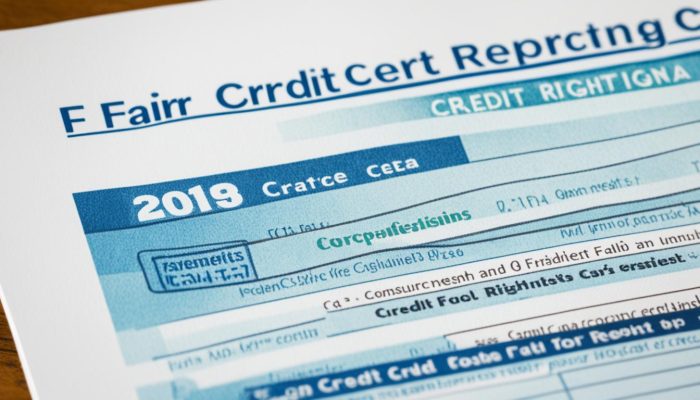Verizon Business is a top name in telecommunications for businesses of all sizes. You might wonder if Verizon Business shares your payment history and credit info with credit bureaus. This can greatly affect your business credit score and history. But, we can’t find a clear answer.
We looked hard through Verizon Business’ website, industry news, and credit bureau sites. Yet, we didn’t find clear details on how Verizon Business reports credit. There were mentions of Verizon’s consumer wireless and postpaid phone services, but nothing specific on credit reporting for business.
So, it’s key for business owners to contact Verizon Business or talk to credit bureaus for the latest on credit reporting. This way, you can make smart choices about your business credit.
Even though we aim to give you the best info, remember that credit reporting can change. Always check the latest sources for the most accurate info for your business.
Key Takeaways:
- Verizon Business’s credit reporting practices regarding business credit bureaus remain unclear.
- Business owners should reach out to Verizon Business directly or consult credit bureaus for accurate information.
- Understanding credit reporting practices is crucial for managing and monitoring your business credit profile.
- Consult the most up-to-date sources for accurate information regarding credit reporting practices.
Understanding the Importance of Business Credit Reports
Business credit reports are key for checking a company’s financial health and creditworthiness. They offer insights into a company’s payment history, credit use, and overall creditworthiness, just like personal credit reports.
These reports keep a detailed record of a company’s financial dealings. This helps lenders, suppliers, and other businesses see the risks and benefits of giving credit or making financial deals. By looking at these reports, people can make smart choices and lower financial risks.
It’s crucial to check your business credit reports often to make sure they’re correct and reliable. Regular checks help spot mistakes or wrong info that could hurt your credit score. They also let you see how your credit history changes over time. This helps you make plans to better your credit score.
Using business credit monitoring services is a good way to keep an eye on your reports. These services send alerts when there are updates or changes to your credit profile. This keeps you in the loop about your credit status and lets you act fast if there are problems.
Keeping a good business credit history and watching your reports closely can boost your chances of getting good credit terms. It also helps draw in potential partners and builds trust with your stakeholders.
“Business credit reports are key for checking a company’s financial stability and creditworthiness. Keeping an eye on these reports is crucial for good credit management and building a solid business credit profile.”
The Role of Business Credit Monitoring
Business credit monitoring is crucial for protecting your business’s finances and reputation. It gives you updates on any big changes in your credit reports. This lets you spot and fix problems quickly.
With business credit monitoring, you can:
- Get alerts and updates on changes to your business credit reports, like new accounts, late payments, or credit checks.
- Find out about any fraud or unauthorized changes to your business credit info.
- See your business credit history over time to spot trends and areas to improve.
- Keep a close eye on your business’s financial health and creditworthiness.
Knowing your business credit history and keeping an eye on your reports puts your company in a strong spot. It helps you get financing, negotiate better terms, and build strong relationships with suppliers and partners.
The Impact of Credit Bureau Reporting on Business Credit Scores
Understanding how credit bureau reporting affects business credit is key. Business credit scores are vital for a company’s financial health and financing options. This section will explain how credit bureau reporting impacts business credit scores and how businesses can keep their credit positive.
Credit bureau reporting means businesses share their payment history and credit info with agencies. These agencies use this data to create credit reports that show a company’s creditworthiness. Lenders and suppliers use these reports to decide on credit terms.
Good credit bureau reporting can greatly improve a business’s credit scores. Making payments on time, managing credit well, and keeping a low credit use ratio helps. These actions make credit agencies notice and can raise credit scores. This makes getting financing easier and builds trust with partners.
But, bad credit bureau reporting can hurt a business’s credit scores. Late payments, defaults, high credit use, and negative public records lower scores. A low score makes getting loans and good credit terms hard. This can limit a company’s growth and expansion.
To manage credit bureau reporting and keep a strong credit profile, businesses need to be proactive. They should check credit reports often, fix any errors quickly, and keep up with payments. This ensures credit scores truly show a company’s financial health.
Having a good business credit score does more than just improve financial chances. It also makes a company look credible to customers, partners, and suppliers. A strong credit profile shows trustworthiness and financial responsibility. This can lead to new partnerships, better business opportunities, and growth.
Next, we’ll look at factors that affect business credit reporting. We’ll see how businesses can handle these factors to keep their credit positive.
Factors Affecting Business Credit Reporting
Business credit reporting in the telecom industry has many factors. Verizon Business’s credit reporting details might be hard to find. But, knowing what affects telecom business credit is key.
Industry Standards and Regulations
Business credit reporting changes across industries due to different rules. The telecom sector has its own credit reporting agencies for telecom businesses. These agencies have their own rules for reporting credit info.
Size and Type of Business
The size and type of business affect credit reporting. Big companies with more financial resources and trustworthiness often report credit. Small businesses, startups, or sole proprietors have different reporting needs.
Credit Relationships with Telecom Providers
How telecom providers report credit can change business credit scores. Some providers work with credit bureaus to report payments. Businesses should ask their providers if and how they report to credit bureaus.
Industry Specific-Reporting Agencies
Some industries have special credit reporting agencies. These agencies focus on certain sectors, like telecom. Telecom businesses should look into these agencies and their reporting effects on credit scores.
Knowing what affects telecom business credit is vital for managing credit well. By staying informed and proactive, businesses can make choices that help their credit scores and trustworthiness.
Managing Your Business Credit Profile
Managing your business credit profile is crucial, even if Verizon Business doesn’t report to credit bureaus. It’s important to take steps to build a strong credit history and score. This can help your business financially and open up growth opportunities.
Evaluate Your Credit Reports Regularly
Keeping an eye on your credit reports is key to managing your business credit. Using a credit monitoring system helps you spot changes or errors quickly. This lets you fix any problems fast. Knowing your credit reports well helps you improve your score and gain trust with lenders and suppliers.
Prioritize On-Time Payments
Always paying bills on time is vital for a good business credit profile. It shows you’re financially responsible and reliable. Set up a payment plan and use reminders to stay on track. This helps avoid late fees that can hurt your credit score.
Manage Credit Utilization Wisely
How much credit you use affects your business credit score. Try to keep your credit use below 30%. Avoid borrowing too much and use credit wisely. This shows lenders you can handle your money well and are less of a risk.
Build Strong Relationships with Suppliers and Lenders
Good relationships with suppliers and lenders can boost your business credit. Being trustworthy and reliable can lead to better credit terms and positive references. These connections can also help when you need financing or credit later.
Stay Informed about Changes in the Credit Landscape
The credit world changes often, and staying updated is key. Learn about new credit reporting rules, trends, and lending practices. This knowledge helps you make smart choices that improve your credit score.
Actively managing your business credit, including business credit monitoring, keeps your credit history and score healthy. This opens up better financing options and boosts your business’s reputation and trustworthiness in the market.
The Role of Business Credit in Building Trust and Credibility
Building trust and credibility is key for businesses. A strong credit score is a big part of this. It shows you’re reliable and financially stable. This makes lenders and partners more likely to work with you.
Good credit means you’re seen as reliable in meeting your financial duties. This opens up better business chances and helps you grow over time.
“Having a good business credit history is like a seal of trust and reliability,” says Amanda Thompson, a small business consultant. “It assures stakeholders that you have a proven track record of payment discipline and financial responsibility.”
Verizon business credit bureaus help businesses keep up their credit profiles. They collect financial data and make detailed reports. These reports show payment history, credit limits, debts, and public records like bankruptcies.
This data is key for corporate credit reporting. It shows how creditworthy a business is. Lenders and partners check these reports to decide if they want to work with you. So, keeping a good credit history is very important.
Benefits of Building Trust and Credibility through Business Credit
Having a strong business credit profile brings many benefits:
- Access to financing: Lenders give better terms to businesses that manage credit well.
- Better supplier relationships: Suppliers offer good payment terms and discounts if they trust your creditworthiness.
- Attracting investors: Investors like businesses with strong finances. A good credit history makes your business more appealing.
- Competitive advantage: A strong credit profile sets you apart from competitors and builds trust.
By managing your business credit reports well, you can build trust and credibility. This helps your business grow and succeed over time.
Leveraging Business Credit to Fuel Growth
A strong business credit profile is key for businesses looking to grow. Keeping a good business credit history and managing corporate credit reporting well opens doors for growth.
Having a solid credit profile means better access to loans and credit lines. Lenders look at credit reports to see if a company is trustworthy. Companies with good credit get loans at better terms and rates.
With this money, businesses can grow. They can open new locations, buy new equipment, advertise, or hire more people.
Also, a strong credit profile builds trust with partners, suppliers, and customers. It shows a company is reliable and financially responsible. This can lead to more business opportunities and partnerships.
To use business credit well, it’s important to watch and manage credit reports. Checking reports from Verizon business credit bureaus and others helps spot mistakes that could hurt credit scores.
Fixing mistakes and keeping good credit habits makes a company more trustworthy. This helps with growth.
“A strong business credit profile not only grants access to financing but also establishes trust and builds credibility, opening doors for business partnerships and driving overall growth.”
Working on a good business credit history is smart for businesses of all sizes. It helps with long-term success and opens doors for growth.
Steps to Leverage Business Credit for Growth:
- Establish a business credit file: Apply for a business credit card or start trade credit with suppliers.
- Make timely payments: Pay bills and credit on time to avoid hurting your credit score.
- Keep credit utilization low: Keep credit card and line of credit use under 30% for a good credit score.
- Regularly monitor credit reports: Check credit reports often and fix any mistakes quickly.
- Establish positive trade relationships: Work on building trade credit with trusted suppliers and vendors.
By following these steps and making smart credit choices, businesses can use their credit to grow and reach their goals.
For more info on how business credit affects growth, read this article on using business credit for success.
Conclusion
It’s not clear if Verizon Business reports to credit bureaus, but managing your business credit is key. Keeping an eye on your business credit reports and managing your credit well can help your business grow. It’s important for owners to know how their credit is reported and get the right info from Verizon or credit bureaus.
This knowledge helps in making smart choices about credit management. By doing this, businesses can set themselves up for success. Staying updated on credit reporting practices is crucial for business owners.
They should get accurate info from Verizon or credit bureaus. This way, they can make informed decisions about their credit. This approach is vital for a business’s financial health.
FAQ
Does Verizon business report to credit bureaus?
Verizon Business doesn’t give clear info on credit reporting. Business owners should contact Verizon or check with credit bureaus for details on credit reporting.
What are business credit reports?
Business credit reports show a company’s payment history, credit use, and creditworthiness. Lenders and suppliers use these reports to decide on credit extensions or financial deals.
How does credit bureau reporting impact business credit scores?
Reporting to credit bureaus affects business credit scores directly. Good payment history and smart credit use can boost a business’s score. This makes it easier to get loans, credit lines, and good terms from suppliers.
What factors affect business credit reporting?
The business’s size, industry, and credit type can affect reporting. Some sectors have their own credit agencies.
How can businesses manage their credit profile?
Businesses should check their credit reports for mistakes and fix them. They should also manage credit well by paying bills on time, keeping credit use low, and building good supplier and lender relationships.
What role does business credit play in building trust and credibility?
A solid business credit profile shows reliability and financial health. This makes lenders, partners, and investors more likely to work with you. It shows you can meet financial duties and keep up with contracts.
How can businesses leverage business credit to fuel growth?
Good credit means better financing terms and rates. This can help fund growth, buy new gear, or hire more staff.



